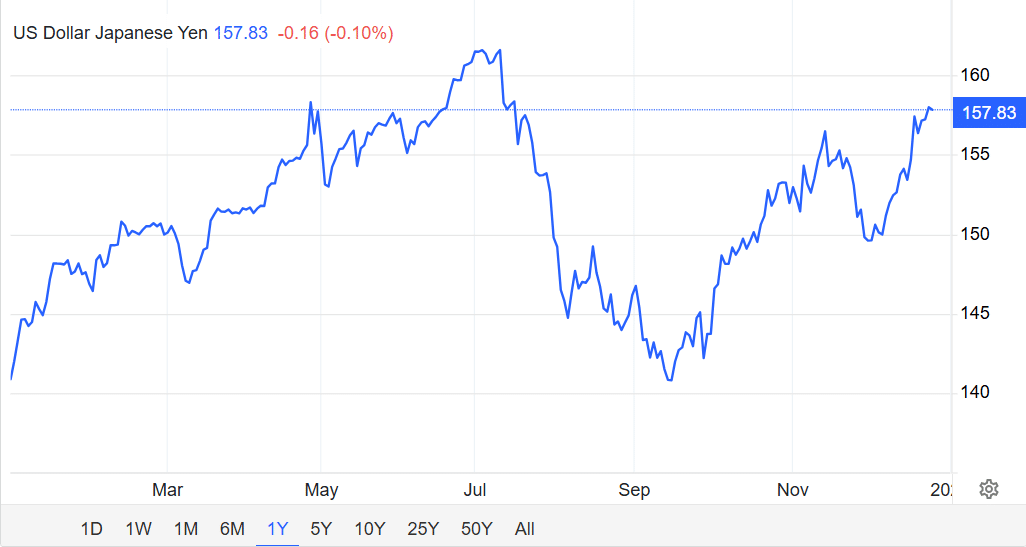- Bitcoin reserves have sparked intense controversy, with countries deeply divided over their potential.
- As Japan faces increasing economic pressure, could its difficulties make for a perfect case study?
The Bitcoin (BTC) reserves debate is dividing the market. Some see it as a crucial hedge against dollar volatility, while others remain deeply cautious, concerned about the associated speculative risks.
The divide is so deep that even the Fed and the Trump administration are at odds, each taking a very different stance on the issue.
Now, Japan is joining the conversation, raising concerns about the potential risks of including Bitcoin in its foreign exchange reserves.
But here’s the catch: The Japanese yen has hit a five-month low against the U.S. dollar, joining a growing list of G20 currencies struggling to keep up with the dollar’s dominance.
So will Japan’s cautious approach to Bitcoin reserves be seen as a missed opportunity? Or will this economic pressure push Japan – and other countries – to finally recognize BTC as a serious alternative?
Untangling Japan’s economic storm in 2025
The recent FOMC rate cut has triggered a ripple effect across markets, triggering an “unexpected” twist.
On December 18, as the Fed’s decision made headlines, the U.S. dollar hint hit a staggering two-year high of 108.54.
The consequences were swift and brutal. Bitcoin plunged 14% in just three days, while global currencies collapsed under the pressure. The Japanese yen was not spared, plunging to its lowest level in five months, at 158 per dollar.


Source: Trading Economics
In immediate response, the Bank of Japan (BOJ) held firm, keeping interest rates stable. But the real storm may be coming.
The long-term impact of a rising dollar could be considerable, with inflationary pressures increasing.
The signs are already there. Annual inflation in Japan rate reached 2.9% in November 2024, up from 2.3% the previous month, marking its highest level since October 2023 – and it’s more than just a number on a graph.
This surge in inflation is a clear signal of what is to come. Rising inflation, coupled with the strong dollar, puts Japan in a difficult situation. Imports are becoming more and more expensive, putting a strain on businesses and consumers.
All of this is taking place against the backdrop of Japan’s demographic crisis – an aging population and falling birth rates.
This shift weakens the workforce, making the challenges of 2025 even more daunting.
So, are Bitcoin reserves the right solution?
The answer is not clear: it is both a “yes” and a “no”. On the one hand, Bitcoin’s limited supply makes it a strong hedge against rising inflation.
Unlike the U.S. dollar, which can be printed at will, Bitcoin’s capped supply provides Japan and other economies with protection against currency devaluation.
However, there is one major drawback. The price of Bitcoin can be very volatile, making it a risky asset for a country like Japan, which values stability above all else.
That said, as the Japanese economy faces increasing strain, the idea of adopting Bitcoin reserves may not be as far-fetched as it once seemed. In fact, it may soon become a necessity for economic resilience.
And this change does not only concern national economies. On a smaller scale, major exchanges are also stacking Bitcoin. For example, Bitfinex’s Bitcoin reserve recently reached over $230 million, a level last seen three years ago.
As more countries view Bitcoin as a “safety net” against increasing volatility in global markets, high liquidity is expected to flood the market as exchanges prepare for increased demand.
Read Bitcoin (BTC) Price Prediction 2025-26
So, as the US dollar continues to dominate, many economies are looking for alternatives. Bitcoin could be the answer, but only if its price stabilizes over the coming year.
If so, the possibility of using Bitcoin as a hedge and even a payment method may no longer be a distant dream.




